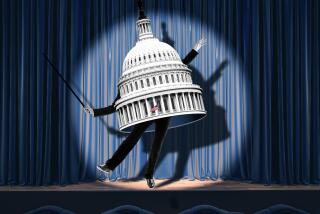NEA to Seek Senate Help to Stop House Bid to End Funding
- Share via
Responding to an agreement reached Thursday by House Republican leaders that could dramatically shorten the life of the already-embattled National Endowment for the Arts, a spokeswoman for the federal arts agency said Friday that the NEA will be looking for support from the Senate in upcoming weeks as the agency’s future is debated on the Hill.
Bowing to pressure from more conservative members of the House, Republican leaders agreed Thursday to phase out funding for the arts endowment by 1997--a year earlier than they had originally planned and five years ahead of the Senate’s proposed schedule.
House GOP leaders agreed to limit themselves to providing money for the NEA only for the next two years. House leaders also promised to seek separate legislation that would terminate the agency after two years.
The House bill would provide the arts and humanities endowments with $100 million each in fiscal 1996, about 40% less than they received this year. While the House agreed to phase out the arts endowment during Thursday’s debate, it did not reach a similar agreement to shorten the life of the National Endowment for the Humanities--although two amendments that would set a 1997 deadline for both agencies are reportedly making their way through the House.
The concession to shorten the life of the NEA ended what was termed a “mutiny” by some five dozen of the House’s newer, more conservative members, allowing the chamber to resume debate on a number of other issues during a daylong debate over an $11.96-billion appropriations bill for 1996.
Ellen McCulloch-Lovell, executive director of the President’s Committee on the Arts and Humanities, said Friday: “I think ultimately we don’t believe that this will kill the endowment. . . . The endowment battle is far from over. This is a more serious skirmish than we’ve had before; people who care about this need to get more involved. But there are still many processes to go through, and we hope people will realize all the good things the NEA has done and come up with a reasonable approach.”
While acknowledging that the agreement deals a blow to the agency, NEA spokeswoman Cherie Simon said the fate of the NEA still rests with the Senate, which has on its agenda for Wednesday to debate the issue of NEA reauthorization. She added that the issue still must eventually go to conference, meaning the future of the agency will not be known until late September or early October.
Simon noted, however, that the House agreement to limit the NEA’s life to two years is “very significant.”
The NEA is pinning its hopes on the Senate, Simon said. “We have much broader bipartisan support in the Senate,” she said. “I would say that the rule on the vote signaled the change in the political landscape, but the debate hasn’t even started yet. The Senate has to go on the floor and talk about it.”
Simon added that, while the Senate has expressed a desire to restructure the agency, it has remained supportive of preserving a national leadership role for the NEA, rather than sending most of the federal arts funds directly to the states, as favored by the House.
*
Kansas Republican Sen. Nancy Landon Kassebaum, who is head of the Labor and Resources Committee that oversees authorization for the arts and humanities endowments, was not immediately available for comment, but Joel Bacon, a spokesman for Kassebaum, said that Kassebaum “has been supportive of a federal role in arts funding and the NEA in the past. However, she has said that she supports re-evaluation of the agency and stresses government funding of those things that have broader appeal.”
In May, Kassebaum and Sen. James Jeffords (R-Vt.) introduced legislation to amend and reauthorize the NEA in a “streamlined” fashion, dividing available funds into three categories: “partnership” grants to individual states (40%), “Grants of National Significance” (40%) and direct grants to groups and individual artists (20%).
Helen Brunner, executive director of the Washington-based National Assn. of Arts Organizations, said Friday that the House agreement is “devastating. . . . It does look more dire than usual, and we expected it to be more dire than usual. We are in a situation where the House and Senate are leaning increasingly more to the right, although there are moderate Republicans, and the NEA does have some bipartisan support.”
In anticipation of continuing federal arts funding cuts, Brunner said that her organization has been concentrating on cultivating private funding sources, as well as trying to influence voters to support arts-friendly candidates in the 1996 elections. She added, however, that further cuts or elimination of the NEA could kill many smaller grass-roots, community-oriented and ethnic-specific arts organization nationwide.
“We have been working very much in support of the NEA, but we have been cognizant of the fact that the agency will come out crippled at best, after this is over. Following this summer’s battle that is probably what we will see--it will not be eliminated, but severely crippled,” Brunner said. “They already have a skeleton staff. . . . Our [member organizations] have, with a saddened heart, been diversifying their income.”
More to Read
The biggest entertainment stories
Get our big stories about Hollywood, film, television, music, arts, culture and more right in your inbox as soon as they publish.
You may occasionally receive promotional content from the Los Angeles Times.










